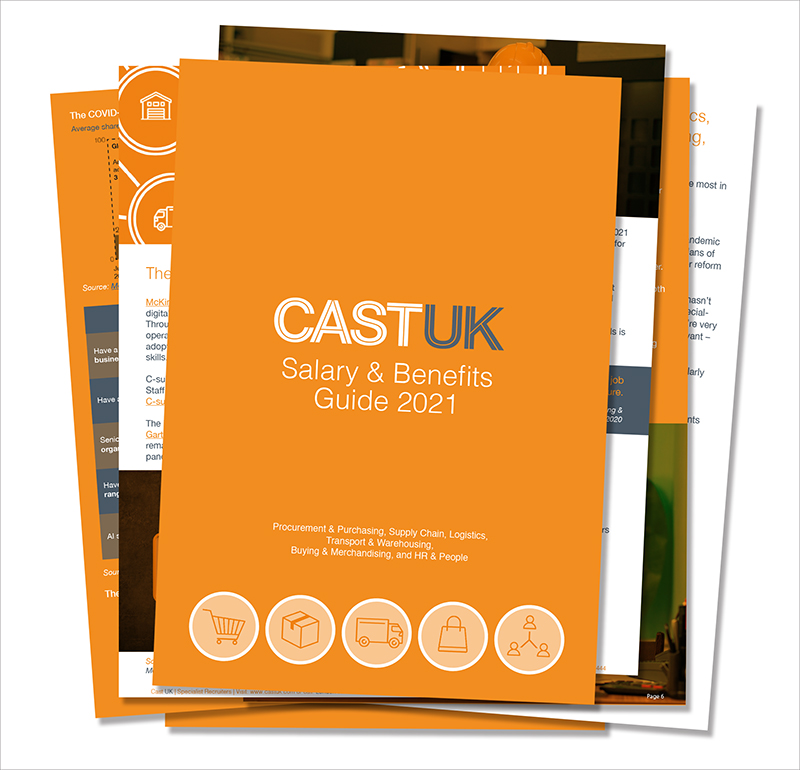
Wayne Brophy
Feb 12, 2021
2021 Outlook: The Top Recruitment Trends Of This Year
What will 2021 bring? After the most chaotic year in modern history, the usual recruitment trends have been thrown out the window. Thankfully, each year we gather insights across a variety of specialisms (procurement & purchasing, supply chain, logistics, transport & warehousing, buying & merchandising, and HR & people) to discover recruitment trends, average salaries, and most in-demand skills and benefits. Here, we share just a few of the most important insights from our Salary & Benefits Guide 2021...
Key market and hiring trends
From Brexit and the IR35 reform to the pandemic, many factors have shaken up the key market and hiring trends:
Economic disruption Whilst Brexit has been on the cards for years, almost a third of candidates we surveyed worried about its impact on their job security. Likewise, we’ve noticed a big increase in the demand for import and export roles recently – showing that some businesses haven’t been entirely proactive in their preparations. Along with the economic disruption caused by the pandemic, businesses are looking to increase their usage of interim specialists and a multi-skilled workforce.
The rise of robots, AI and big data COVID-19 also caused AI investment to skyrocket, with a Gartner survey showing that 30% were planning to increase spend in this area. As nearly 90% of candidates welcome the prospect of automation, this appears to be good news - especially as resulting recruitment trends include a growing demand for related skill sets, as well as upskilling to fill the digital skills gap. However, with with only 18% of CEOs having made headway with an upskilling programme, it’s clear that more work is needed. IR35 As it currently stands, the IR35 private sector reform is due to come into effect on 6th April 2021 and businesses need to be effectively prepared. Qdos Contractor research shows that almost half of contractors intend to carry on contracting. Therefore, it’ll be critical to consider how to engage interim candidates whilst balancing compliance and cost-efficiency.
In-demand skills and experience by specialism
Across every single specialism we surveyed, the skills and experience that are in-demand this year are very different to those that were sought after in 2020:
Procurement & purchasing The pandemic has thrown the spotlight on just how important supplier management is. Candidates now need to be great collaborators. There's also a demand for them to use their own initiative and plan their workflow and time without issue.
Supply chain Data analysis skills are a crucial requirement in the supply chain specialism, as well as crisis management. They also need to be able to build strong relationships with suppliers to drive supplies through.
Logistics, transport & warehousing With demand having risen by as much as 300% in some businesses, this specialism will require candidates who can take on multiple responsibilities and adapt well to change. They should possess ‘soft skills’ such as effective team engagement too.
Buying & merchandising As there's been a substantial move towards eCommerce, fantastic technology capabilities will be essential. Candidates will be required to show how they add value to wider business strategies, as well as hold strong technology skills.
HR & people HR has changed - it has become less of a transactional role and now requires high levels of commercial acumen and exposure. Candidates will be required to show how they add value to wide business strategies, as well as hold strong technology skills.
What candidates want
Only 61% of employers have an employer value proposition (EVP), which shows there is still a lot of work to be done in boosting employer branding. Key to this will be knowing what candidates want and need:
- Flexible and remote working has become the norm, and the stability and longevity of potential employers has become incredibly important.
- Salary was unsurprisingly one of the most valued factors across all the specialisms. However, employees were by and large more satisfied with their company's pandemic response and COVID-secure measures.
- Annual leave and pension contributions were commonly ranked as the most important benefits to candidates, although feeling valued and challenged proved to be more essential to a role than perks.
This isn't all that our Salary & Benefits Guide 2021 unearthed. It covers candidates' thoughts on job security and market optimism, as well as how the pandemic impacted them. Plus, it takes a deeper dive into the different specialisms, offers guidance on employer branding, and reveals further interesting recruitment trends and statistics.
Click here to download the Salary & Benefits Guide 2021 and discover our findings in full.



